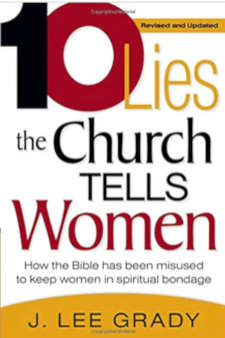Why Won’t These 8 Christian Denominations Allow Women to Serve as Pastors?
Earlier this summer, the Southern Baptist Convention’s decision to disfellowship three churches that allowed women to serve as pastors sparked significant controversy. The one that garnered the greatest amount of attention was Saddleback, retired Pastor Rick Warren’s former church in California.
In June, the Southern Baptist Convention, at its annual meeting, voted to uphold its previous decision to remove Saddleback church from the denomination because of its appointment of female pastors, a stance and practice the SBC rejects.
The SBC is the largest Protestant denomination in the U.S. and Warren has been adamant in his stance opposing the SBC’s decision, as Charisma columnist Lee Grady reported.
Andy Wood was appointed as senior pastor after Warren left earlier this year. Saddleback hired a teaching pastor that just happened to be Wood’s wife, Stacie, and that’s when the Southern Baptist Convention got involved. Section 6 of the SBC’s Baptism and Faith message reads, “While both men and women are gifted for service in the church, the office of pastor is limited to men as qualified by Scripture.”
Despite a great deal of pushback from many in the kingdom, the SBC stood firm in its decision and expelled Saddleback from the SBC; and it is not the only Christian denomination that restricts women from serving as pastors or priests.
Several other denominations uphold similar beliefs, often rooted in their interpretations of Scripture and tradition. Here are seven more who agree with this policy:
1. The Orthodox Church: With roots dating back to the first century, the Orthodox Church has maintained its tradition of only ordaining men to the priesthood. This stance is based on Holy Tradition and the view of ministry, and it isn’t limited to the ordained priesthood. The Orthodox Church upholds the significance of tradition in its position.
2. Roman Catholic Church: The world’s largest Christian denomination, Catholics have long upheld the prohibition of women’s ordination. It’s stance is based on the belief that Christ chose only men as His apostles and that example must be followed. The policy has been challenged many times, but never overturned.
3. American Baptist Association (ABA): The ABA is a network of independent Baptist congregations that adhere to the belief that only men should hold positions of ordained church leadership. Their conviction is rooted in the interpretation of passages from the books of Titus and 1 Timothy that outline qualifications for church leadership roles and specify men.
4. Evangelical Free Church of America (EFCA): The EFCA recognizes the value of women’s gifts and ministries but refuses to ordain women as pastors. Their stance is complementarian, recognizing the distinct roles of men and women in the church.
5. Lutheran Church—Missouri Synod (LCMS): This denomination has a history dating back to the 19th century. Like others mentioned here, it adheres to the belief that the pastoral office and authority were bestowed upon men by scriptural teachings and centuries of Christian tradition. This position, too, has been challenged, but nothing has changed.
6. Orthodox Presbyterian Church (OPC): Founded by J. Gresham Machen, OPC differentiates between religious and civil authority, noting that biblical figures like Deborah held civil leadership roles rather than religious ones. OPC sees those as distinct from pastoral ministry.
7. Presbyterian Church in America (PCA): Formed in 1973 as a conservative alternative to the Presbyterian Church in the United States (Southern), the PCA firmly opposes women’s ordination as pastors or elders. The denomination sees this issue as a matter of biblical authority, but there is ongoing debates about the extent to which women can serve in other church ministries, such as deacons.
 A Lifeway Research study, released earlier this year, tells a different story as it found that 55% of U.S. Protestant pastors reported that the senior pastor role is open to women in their churches. That includes a whopping 94% agreement by Methodists and 78% agreement by Pentecostals.
A Lifeway Research study, released earlier this year, tells a different story as it found that 55% of U.S. Protestant pastors reported that the senior pastor role is open to women in their churches. That includes a whopping 94% agreement by Methodists and 78% agreement by Pentecostals.
The previous eight examples, however, refuse to change their position on the subject and will continue to take on massive criticism from a large portion of the kingdom for sticking to their traditions.
In his book 10 Lies the Church Tells Women, J. Lee Grady tells how the Bible has been misused to keep women in spiritual bondage. {eoa}
Join Charisma Magazine Online to follow everything the Holy Spirit is doing around the world!
Shawn A. Akers is the online editor at Charisma Media.














































